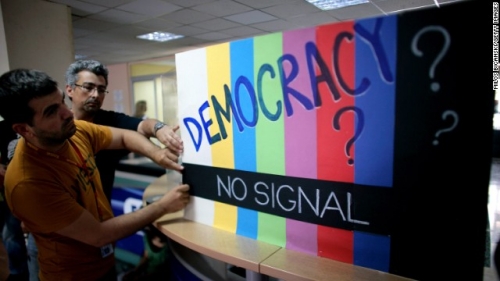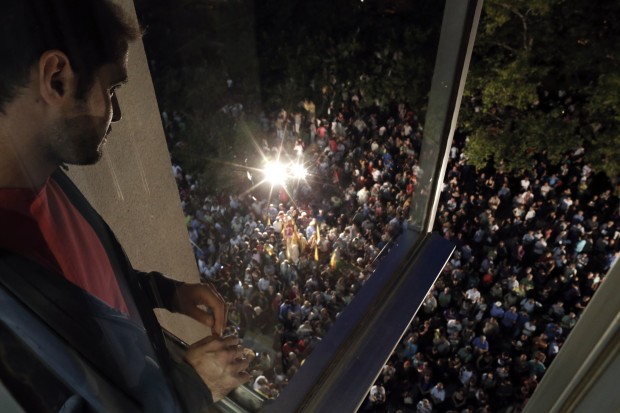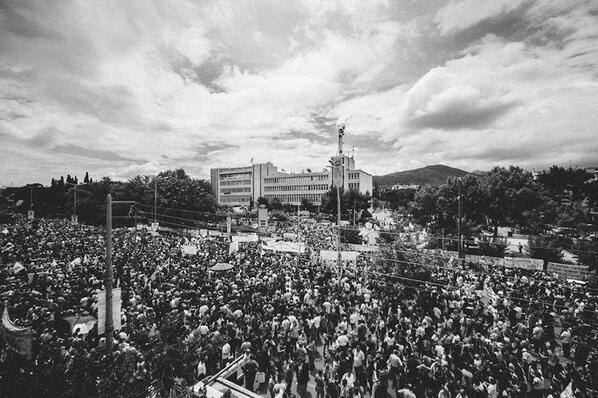Occupy ERT: the revolution will be live-streamed
- June 14, 2013
People & Protest
Greece’s neoliberal government may have shut down public television to please its creditors, but stay tuned: the revolution may still be live-streamed.
- Author
In a move that reminded many of the darkest moments in Greece’s political history, the neoliberal right-wing coalition government of Antonis Samaras decided — without any warning whatsoever — to close down ERT, the Greek Public Radio and Television Network, and lay off its 2,700 workers. ERT is an umbrella organization paid for by the Greek public, which encompasses three TV channels and four radio stations that broadcast country- and worldwide, sustained by the contributions of Greek citizens themselves, just as any other public media network. The case is the equivalent of the UK government shutting down the BBC, or the Italians shutting down RAI overnight.
And so, in the morning of June 12, 2013 Greece woke up without a public TV channel or public radio, while 2,700 ERT workers woke up unemployed. Ever since, the fired workers of ERT have occupied the station’s headquarters in Athens and have kept broadcasting through live-streaming. That makes ERT the first public television network under workers’ control in Europe, and maybe the first in the world. Meanwhile, tens of thousands of citizens have been gathering inside and outside the headquarters in solidarity with the workers as well as in their defense: the government may send in the police to break the occupation any time, just like it did in the case of the Steelworkers’ strike of Aspropyrgos last year.
 The government, through its spokesman Simos Kedikoglou, argued that the Greek state “in these times of crisis” cannot afford to maintain public television and that, loyal to the Troika’s dictates, it would shut down ERT that same night and create a new public information network, with fewer workers, within the next three months. So, to get this right, the Greek government is claiming that it has to obey the Troika’s orders — order that the Troika itself (the IMF at least) admits have been a disastrous failure — and dismiss 2,700 workers in a country in which already 27% of the overall population and 62% of the youth are out of work.
The government, through its spokesman Simos Kedikoglou, argued that the Greek state “in these times of crisis” cannot afford to maintain public television and that, loyal to the Troika’s dictates, it would shut down ERT that same night and create a new public information network, with fewer workers, within the next three months. So, to get this right, the Greek government is claiming that it has to obey the Troika’s orders — order that the Troika itself (the IMF at least) admits have been a disastrous failure — and dismiss 2,700 workers in a country in which already 27% of the overall population and 62% of the youth are out of work.
At the same time, by closing down the public television and radio networks, the state leaves the information of its citizens in the hands of the private TV channels and radio stations. And of course, the private TV channel owners — most of which belong to the class of the Greek oligarchs who also compete for the state assets under privatization — will have to pay back the favor to the government in any way they can. That was not said by Simos Kedikoglou, but any rational person can read this between the lines.
 Meanwhile, however, the Greek citizens seem to be waking up from their lethargy once again: on Thursday, a general strike was held against the government and in solidarity with ERT, while the people are once again taking to the squares all over the country to protest ERT’s closure. Meanwhile, the other two coalition member-parties, PASOK and DIMAR, have announced their disagreement with the government’s decision; a development that may even lead to a break-up of the coalition and a dissolution of the government.
Meanwhile, however, the Greek citizens seem to be waking up from their lethargy once again: on Thursday, a general strike was held against the government and in solidarity with ERT, while the people are once again taking to the squares all over the country to protest ERT’s closure. Meanwhile, the other two coalition member-parties, PASOK and DIMAR, have announced their disagreement with the government’s decision; a development that may even lead to a break-up of the coalition and a dissolution of the government.
This latest development cannot be disconnected from the Greek government’s neoliberal drive we’ve been witnessing during the past years. After selling out the profitable OPAP (Greek Organisation of Football Prognostics, the country’s public gambling company) to Dimitris Melissanidis, a ship-owner and very close friend to Antonis Samaras’ advisor Failos Kranidiotis; and after the announcement of the privatization of the state water companies in Athens and Thessaloniki, now it’s the turn of the public television — not to be privatized, but to be erased from the map, in favor of its private media competitors that belong — guess to whom? — to other Greek oligarchs.
The strategy is clear and very well know: “first we degrade public services, and then we privatize them.” And don’t be fooled: this is not only about Greece; it is a global trend. What’s next? Public health? Education? Stay tuned. The revolution will not be televised, but it may be live-streamed.
Source URL — https://roarmag.org/essays/occupy-ert-the-revolution-will-be-live-streamed/


